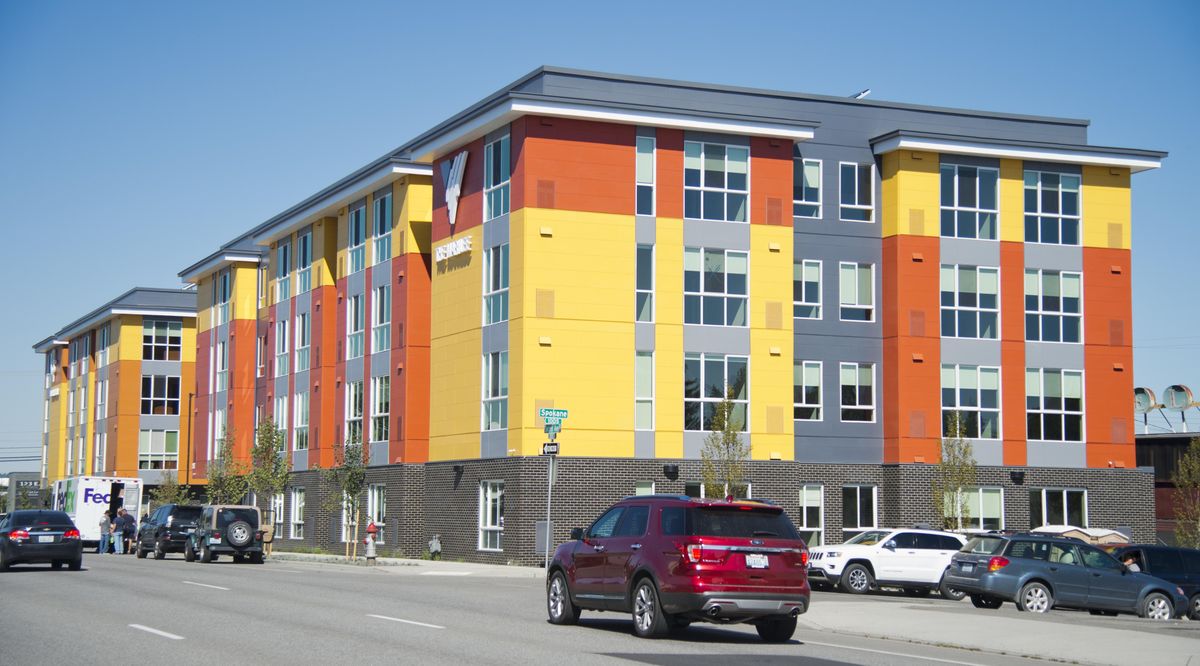Catholic Charities, Volunteers of America open two new high-rises for the homeless

One hundred chronically homeless people in Spokane will soon have an apartment to call their own.
On Thursday, Catholic Charities of Spokane and Volunteers of America celebrated the opening of Buder Haven and The Marilee, two permanent supportive housing projects for homeless people who struggle with mental illness, substance abuse or other challenges.
“What you see before you is the answer to the question, ‘What are we doing about homelessness in Spokane?’ ” said Monique Kolonko, the associate director at Catholic Charities who oversees housing projects. A crowd of about 150 people applauded as staff from both organizations spoke about the project and Bishop Thomas Daly blessed the new apartments.
The bright orange and yellow buildings on East Second Avenue are the latest local step in a national shift toward a “housing first” approach to tackling homelessness. Rather than mandating residents be sober or have mental illness symptoms under control, the apartments are leased on the belief that it’s easier to get sober, get a job and receive health care when you have a place to live.
Housing-first advocates say the approach saves money by reducing the number of emergency service calls to deal with chronically homeless people. If someone is drunk or having severe mental health symptoms, they can rest in their own apartment instead of passing out on the sidewalk or wandering in the streets, resulting in a police call and a trip to the emergency room.
Ezra Bedeski, 39, moved into his studio apartment at Buder Haven in mid-July with his therapy dog, a 4-year-old black pug named Grim.
Before Buder Haven, Bedeski spent a year and a half without a home, sleeping outside and couch surfing with friends while dealing with severe anxiety and mental health problems. Grim helps him get outside and remember to be social, he said.
Many of his family members bought him movies and other gifts when he moved. He now boasts a large collection of DVDs showcasing his favorite superheroes, as well as science fiction and fantasy classics, like “Star Wars” and “Lord of the Rings,” which his neighbors regularly come over to borrow. Most of his decor is Superman themed.
“If it wasn’t for Catholic Charities, I don’t know where I would be right now,” Bedeski said.
The apartments were built with a mix of state, city, county and private funds, totaling about $10 million for each of the two 50-unit buildings. The City of Spokane contributed $1.4 million toward Buder Haven, while Spokane County chipped in $1.2 million for The Marilee.
The Marilee, which will be run by Volunteers of America, is the namesake of the group’s now-retired longtime president and CEO, Marilee Roloff. Catholic Charities’ Buder Haven is dedicated to the parents of Sister Madonna Buder, who has ministered to jail inmates for decades.
Each building has a mix of one-bedroom and studio apartments, as well as a common area for tenants to spend time. A social worker is on-site to get to know residents and help them access services they need.
The apartments are designed to be permanent housing, so there’s no time limit to how long someone can live there. After one year in either facility, a tenant qualifies for a low-income housing voucher allowing them to move elsewhere if they’d like to be out of downtown.
The buildings have rules for behavior, mostly about keeping up the apartment and not disrupting other tenants, but refusing treatment or using drugs won’t get someone kicked out. People qualify for units based on a history of homelessness, as well as other factors like need for mental health care. Tenants pay 30 percent of their gross income in rent, which may be as little as $50 a month for some.
Catholic Charities opened its first supportive housing project, Father Bach Haven, in 2013. Connie Birdtail, who works as the social services coordinator there, said many tenants tear up when they first step into their new unit.
“Their first comment to me was, ‘This isn’t mine,’ ” she said.
Birdtail said nearly half of Father Bach Haven’s current tenants have lived there since the building opened, staying off the streets.
One tenant got her first job in nine years while living at Father Bach Haven. She was so thrilled with her first paycheck, she treated herself to a coffee from Starbucks, Birdtail said. That woman has now moved to an apartment on the north side of Spokane.
“She smiles all the time now. She’s friendly. She’s social,” she said.
Birdtail hosts social events for her residents, like grocery bingo, where people can win groceries she’s bought for them, and a large Thanksgiving dinner every year. She regularly sees people who wouldn’t trust anyone when they moved in giving toilet paper to their neighbors or helping out in common areas of the building.
“They’ve really developed a sense of community, and I feel privileged to be a part of that,” she said.
Many of the people who will fill the apartments got there via the city’s existing emergency shelter system. Shelters like the House of Charity and Hope House have struggled with funding as federal grants have shifted more toward permanent housing. The city earlier this year committed to funding the House of Charity as a round-the-clock shelter starting in 2017 in response.
“The work done in those shelters builds trust to be able to get people into stable housing,” said Fawn Schott, the current president of Volunteers of America.
Catholic Charities is planning to build several similar facilities in Spokane County and envisions putting an end to chronic homelessness.
“This is just the beginning,” said executive director Rob McCann.